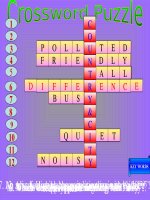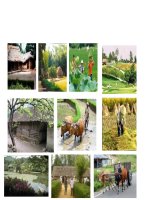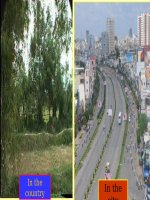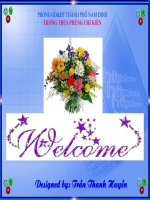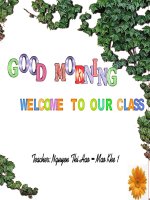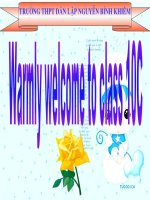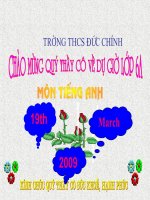UNIT 8 and UNIT 9
Bạn đang xem bản rút gọn của tài liệu. Xem và tải ngay bản đầy đủ của tài liệu tại đây (734.75 KB, 38 trang )
Unit 8: CELEBRATIONS
A) LISTEN & READ:
I) New words :
1. Celebrate(v) : > celebration (n): Sự cử hành lễ
2. Easter (n): Lễ phục sinh
3. Although (conj.): cho dù, mặc dù,
4. Throughout the year: suốt năm
5. To occur= to happen: xảy ra
6. To decorate: trang hòang, trang trí
7. Special food: món ăn đặc biệt
8. Sticky rice cake: bánh tét
9. Apart( adv) cách xa
10. Passover(n): lễ Vượt Qua, lễ Quá Hải
11. Jewish people: Người Do Thái
12. Freedom: (n) sự tự do
13. Slavery: (n) chế độ nô lệ
14. Ancient(a): cổ xưa
15. Mid- Fall festival: Tết trung thu
16. Joyful (a): vui mừng
17. Parade (n):cuộc diễu hành
*useful prepositions :
1. in late January: vào cuối tháng giêng
2. to live apart: sống xa nhà
3. at Tet: vào Tết
4. on this festival: vào dịp lễ này
5. freedom from slavery: sự tự do thóat khỏi ách nô lệ
6. on the first night of Passover: vào đêm đều tiên của ngày Lễ Vượt Qua
7. on Easter Day: vào lễ Phục Sinh
II) Fill in blanks :
1. The houses are ……………with many colorful lights.
2. Tet is a festival which ……… in late January or early February.
3. ……… is a joyful festival which is celebrated in many countries .
4. ………is in late March or early April.
5. Christmas and Easter are the main Christian ……………
6. ………… the night before Christmas, Santa Claus enters each house by
coming down the smoke hole of the fireplace.
7. He didn’t get a job…………everyone thought he was the best man for it.
8. On National Day there is usually a ………… in Ba Dinh square.
III) TRUE or FALSE :
1. They decorate their houses with sticky rice cakes before Tet.
2. Easter always happens on Sunday.
3. People try to live apart their families at Tet.
4. There are many colors in the parades on Easter Sunday.
5. Adults give children chocolate and boiled eggs on Easter.
6. Tet occurs before the Lunar New Year.
7. All of the children receive sugar eggs even though they are bad.
8. Passover is celebrated all over the world .
9. There are colorful parades on Christmas Day.
10.Sticky rice cakes is a special in Israel.
B) SPEAK:
I )New words
1. A compliment ( n) : Lời khen ngợi
2. Active student : hoc sinh năng động
3. Charity (n) : lòng từ thiện, bác ái
4. > charity activity: hoạt động nhân đạo
5. To nominate: (v) đề cử, bình chọn
6. Effective (a) hiệu quả,
7. Activist (n) người , nhà hoạt động,
8. Program: (n) chương trình
II)Fill in blanks:
1. Most of my friends are raising money for ………………
2. Tony is the most …………activist in our town.
3. We can watch your favorite …………….by selecting different channels.
4. Students should take part in ……………… in Summer.
5. I congratulate him ………… passing his exam.
6. He has been ……… as the representative of his company.
C) LISTEN :
AULD LANG SYNE.
Should auld acquaintance be forgot and never brought to mind? Should auld
acquaintance be forgot and days of auld lang syne? For auld lang syne, my dear ,
for auld lang syne, we’ll take a cup of kindness yet, for auld lang syne.
Should auld acquaintance be forgot and never brought to mind? Should auld
acquaintance be forgot and days of auld lang syne?And here’s a hand, my trusty
friend and gie’s a hand o’ thine. We’ll take a cup o’ kindness yet For auld lang
syne.
* Auld Lang Syne = Old long since , old long ago
D) READ:
I) New words
1. Feelings (n) : tình cảm, cảm giác
2. Memory ( n) kỷ niệm, trí nhớ
3. To lose heart: nản lòng, mất hy vọng,
4. Tears (n) những giọt nước mắt
5. Towards: ( prep.) về phía, về huớng
6. Groom / bridegroom: (n): chú rể ,
7. To give one’s a hug: ôm ai đó
8. To last : tồn tại
9. Do you know what I mean?: Bạn hiểu ý tôi không?
10.Considerate ( a) có ý tứ, ân cần,
11.Priority (n) sự ưu tiên,
12.To distinguish: phân biệt, làm khác biệt
13.In a word: Tóm lại
14.Terrific ( adv) tuyệt vời
15.Quality ( n) chất lượng, phẩm chất
16.Image (n) hình ảnh,
* Useful prepositions:
1. with tears in your eyes: nước mắt rưng rưng
2. walk towards : đi về phía
3. a moment in time: giây phút đó
4. think about: nghĩ về
5. the best person in the world: người tốt nhất trên thế giới
6. sense of humor: óc hài hước, tính hài hước
7. distinguish… from….: phân biệt … với ….
8. Be proud of: tự hào, hãnh diện
II) Fill in blanks :
1. I was so ……… that my son had been chosen for the national team.
2. When he received his mid- term exam result, he burst into ………
3. “Would you like to help us?”………… a word, no.
4. It was very ………of you to lend me enough money to buy this bike.
5. I sometimes have difficulty ……… Chinese from Vietnamese.
6. It was their twenty – fifth …….anniversary last week.
7. What I like best about my uncle is his …… of humor.
8. There are many occasions for him to ……… his feelings to his girlfriend.
9. It was very …….of you not to play the piano when my child was sleeping.
10.Although she ………… the robber, the police couldn’t catch him.
III) TRUE or FALSE :
1. These are letters written by the children to their teachers.
2. Bob’s father likes sense of humor.
3. His consideration annoyed Bob much.
4. Jane’s living with her father in a house in USA.
5. Rita’s father often makes him cry and laugh.
6. His father asked him not to lose heart.
7. Jane always wants to live with her father.
8. Bob’s father is proud of him and love him so much.
E) WRITE :
I)New words:
1. To share : chia sẻ, phần,
2. To enhance : đề cao, nâng cao
3. Whether or not : có hay không
4. Nationwide : (a / adv) khắp nước, cả quốc gia
II)Complete sentences:
1. It/ necessary/ have/ a day / celebrate / mom.
2. These / occasions/ us / express / feelings/ love / gratitude/ parents .
3. Everyone / love / parents/ want/ happy .
4. I hope / idea / supported / days/ celebrated / nationwide .
5. Father’s Day / children/ send cards/ gifts / fathers.
6. Despite / a little boy / he/ help / mother / housework
7. Do/ agree / me?
F) LANGUAGE FOCUS :
I) New words :
1. To compose: soạn nhạc, sáng tác nhạc
2. Western folk song: dân ca phương Tây
3. Culture (n): văn hóa > Cultural house: Nhà văn hóa
4. To satisfy: làm thỏa mãn, hài long
5. Though = although = even though: (conj.) cho dù, mặc dù
6. National Day: Ngày Quốc Khánh
7. Due to = because of: vì, bởi vì
8. To predict: tiên đóan, dự đóan
9. Gift = present : món quà, quà tặng
II) RELATIVE CLAUSES ( Mệnh đề quan hệ)
1. Định nghĩa:
Mệnh đề quan hệ là mệnh đề được bắt đầu bằng các đại từ quan hệ
( relative pronouns) như : who , whom , which, whose, that, hoặc trạng từ quan
hệ (relative adverbs) where, when và why.
The man who helped me last night is a famous singer.
Trong câu trên , mệnh đề “ who helped me last night” là mệnh đề quan hệ trong
đó “who” là đại từ quan hệ được dùng để thay thế tiền vị từ ( antecedent) “the
man” và mệnh đề còn lại “ The man is a famous singer” là mệnh đề chính.
Thí dụ:
+ The man is a famous singer. He helped me last night.
== > The man who helped me last night is a famous singer.
+The man is a famous singer. You saw him at the airport.
== > The man whom you saw at the airport is a famous singer .
+ The car is very expensive. It is made in Japan.
== > The car which is made in Japan is very expensive.
+ The car is very expensive. He bought it last month.
== > The car which he bought last month is very expensive.
+ That is the man. His son won the first prize .
== > That is the man whose son won the first prize .
+ The tree should be cut down. The branches of the tree are dead.
== > The tree whose branches are dead should be cut down .
2. Cách dùng:
WHO: thay cho người làm chủ ngữ.
WHOM : thay cho người làm túc từ.
WHOSE: thay cho người hoặc vật chỉ sở hữu.
WHICH: thay cho vật làm chủ ngữ hoặc túc từ.
3. Áp dụng :
I)Using who , whose or which:
1. My friend ……………… is now in the hospital was injured in a car accident .
2. The dentist examined a child……… teeth are causing some problem.
3. The minibus goes to Ben Thanh market serves every 15 minutes .
4. My sister works for ABC company makes this shirts, trousers and
coats .
5. The waitress was served me was pretty and always smiled
6. Yesterday I saw Mr. Clare was enjoying dinner in Spice restaurant .
7. There was a terrible car crash killed a woman and her child .
8. The man …………son is a doctor is living next to my house.
9. The Lunar New Year brings us new things is the most important
festival in Vietnam .
10.Yesterday I met her boy friend was wearing a a black hat .
11.This is my old house in I was born and grew up .
12.She’s the journalist…………. Article was on the front page of The Times.
13.Ha’s wedding is on April was celebrated by the bride’s colleagues
was .
II)Combine these sentences using who or which:.
1. This is the lady . She phoned you last night .
2. My friend is in New York . He has just come here .
3. We like enjoying our meals in the restaurant. It is opposite your school .
4. Tomatoes and beans are good for our health. We should eat them .
5. My aunt is a vegetarian. She never eats meat and fish .
6. We should protect forests . They are our lungs .
7. I was careless and broke the vase . My mother has just bought it
8. My dad hates smoking . He can’t bear the smoke .
9. My sister’s doll is very wonderful. It can cry as well as smile
10.I met Hoa . She asked me to give you this gift .
11.My mother has a white cat . She loves it much .
12.My brother worked in the field all day . He is tired .
13.My friends lit a big fire . It dried my clothes .
14.Tim and Shannon felt very excited . They rowed a boat across Saigon river .
15.Do you see a film? It was shown on TV last night .
16.The hotel is very large . We visited it last week .
17.The police arrested the man . He painted advertisements on that wall .
III)ADVERB CLAUSES OF CONCESSION :
( mệnh đề trạng ngữ chỉ sự nhượng bộ)
- thường được bắt đầu bằng :
though, although, even though + S + V….
in spite of/ despite + noun / V-ing
- có thể đứng trước hoặc sau mệnh đề chính.
-Trong câu có though….thì không dùng but, however .
Thí dụ :
1/ Na is very tired. However, she has to finish her homework.
== > Na has to finish her homework although she is very tired. ( bỏ however)
== > Although Na is tired, she has to finish her homework .
2/ I like playing volleyball but I have to complete an assignment.
== > I have to complete an assignment though I like playing volleyball.( bỏ bu t)
== >Though I like playing volleyball, I have to complete an assignment.
Áp dụng:
1. She didn’t like coffee. She drank it ( although) >
2. Don’t forget to treat him well. You don’t like him ( though) >
3. They throw trash on the school yard.There are many garbage bins
around there .( although) >
4. He is not rich . He is generous .( though ) >
5. Carol had a headache, but she still read until late. > Although
…….
6. They are not good at English , but they are glad their teacher. >
Although
7. Although she was successful, she felt dissatisfied > In spite of ……
8. We took many pictures though the sky was cloudy > Despite ….
9. Though the traffic was bad, I arrived on time. > In spite of …
10.I enjoyed the film although the story was silly. > Despite ………
F) IRREGULAR VERBS:
1. To stand/ stood / stood : đứng
2. To draw / drew /drawn: vẽ
3. To think / thought / thought: suy nghĩ
4. To make / made / made : làm chế tạo
5. To hold / held / held : tổ chức, cầm
G) WORD FORM:
VERB NOUN ADJECTIVE ADVERB MEANING
Acquaint Acquaintance Acquainted Quen biết
Act Activity/Activist
/ actor/ actress
Active Họat động,
nhà họat
động
Celebrate Celebration Tổ chức, kỷ
niệm
Charity Charitable Từ thiện
Complimen
t
Compliment Khen ngợi
Consider Consideration Considerate Considerately Ân cần, chu
đáo
Die Death Dead Chết
Decorate Decoration Decorative Decoratively Trang trí
Feel Feeling Cảm thấy
Free Freedom Free Tự do, rảnh
rỗi
Generosity Generous Generously Rộng lượng
Humor/
humorousness
Humorous Humorously Hài hước
Joy Joyful Joyfully Vui mừng
Laugh Laughter Laughing Cười
Mean Meaning Meaningful
Meaningless
Meaningfully
Meaninglessl
y
Có nghĩa,
không có
nghĩa
Nominate Nomination Đề cử, chọn
Occur Occurrence Xảy ra
Satisfy Satisfaction Satisfactory/
satisfying/
satisfied
Satisfactorily Thỏa mãn
Enslave Slave / slavery Nô lệ
Using correct form of the word:
1. He was nominated as the most effective ……… in this city. ( activity)
2. Nothing ……… her; she is always complaining. ( satisfy)
3. Can I use the phone? “ Please, feel ……………. “ ( free)
4. Could you turn your music down and show a little ……. For the neighbors?
( considerate)
5. His success was the ………… of his whole family . ( proud)
6. She laughed ……… in the reunion of all the family. ( joy)
7. The tablets work more ……….if you take them with a hot drink. ( effect)
8. We are increasingly ……… by modern science and technology. ( slavery)
9. He looks happy after a ……… meal. ( satisfy)
10.“We are getting married!” _ “………… !” ( congratulate)
11.The ……… of the house had taken months to complete. ( decorate)
12.We often go to the town …………….house.( culture)
13.I love my mother for her ……………. ( generous)
14.We met her on that ………….occasion. ( joy)
15.She looks back on her career with great … ( satisfy)
16.It’s an extremely ………… cure for a headache. ( effect)
17.Millions of Africans were sold into ……….during the century. ( enslave)
18.The children’s faces were ………. With chocolate. (stick)
19.Hung Vuong festival is a recent……… (celebrate)
20.Are you ………… with our decoration?( satisfy)
21.The consumers want products they buy to work ……. ( effect)
****************
PRACTICE TEST
I) Multiple choice:
1. When did the accident ………?(celebrate/ crowd / occur/ nominate)
2. They ………. the living room with colored lights and flowers two days before their
daughter’s wedding.(decorated/ composed/ consumed / mentioned )
3. Students are always the main force in different ………… activities in our city. (festival/
priority/ charity / compliment)
4. The man was famous for his fight against ………… all his life.( humor/ culture / charity
/slavery)
5. Could you ……… the boy who broke my window? ( describe/ compose/ support /
decorate)
6. Did you notice the ………… in her eyes when she talked about her old friend?
( concessions/ tears/ spam / appliances)
7. ………. a word, I think he’s a fool. ( in /on / at/ about)
8. People make a lot of ……… for Tet every year. ( readiness/ working / preparation /
housework )
II)Give the correct form of the verbs:
1. Passover is ……….in Israel and by all Jewish people. ( celebrate)
2. Tet is a time for us to clean and ………….our houses. ( decorate)
3. Nam has been …………… as a leader.( nominate)
4. Christmas is a great holiday which ……… on December 24
th
( occur)
5. The baby ………… crying when she saw that toy. ( stop)
6. They ………. out all the comic books since last week. ( sell)
7. It’s not easy…….(get)used to ……… (eat) with chopsticks.
8. He’s very busy ……… care of her( take)
9. ……… (look) at me and…………. (answer) my question.
10. He gave up …………… years ago. ( smoke)
III)ERRORS:
1. My father is a consideration and generous man who is loved by his family and friends.
2. My friend usually goes to school by the bicycle.
3. Mr. John is interested in working as a teacher because he enjoy teaching.
4. The stories what I have told you are all true.
5. She saw me and stopped to talk to me while she is going shopping this morning.
6. There are many occasions for you to express your feelings for others .
7. Passover is the festival which is celebrated on late March or early April .
8. Auld Lang Syne is a song it is sung on New Year’s Eve .
IV) CLOZED TEST:
1)In America, Thanksgiving Day is observed every year on the fourth Thursday of
November. It was first celebrated by native Americans in the early 17
th
century to celebrate a
plentiful harvest.
A big party with family and friends is the most popular activity on this day . They often
have turkey, bread, potatoes and pie. Many people even watch football match on television
while eating. In some regions, people decorate their churches and houses with fruits, flowers
and vegetables .
Thanksgiving Day is also an official holiday in Canada; however , it always falls earlier
in Canada than in United States. Since 1957, Canadian Thanksgiving Day has been observed
on a fixed day: the second Monday of October.
TRUE or FALSE
1. Thanksgiving Day sometimes happens on Thursday in America.
2. They used fruits, bread and flowers to decorate their houses.
3. It happens on the second Monday of October in USA.
4. Nowadays, in Canada Thanksgiving Day is a fixed day
2) Vietnamese Teacher’s Day is always …………(1) on 20
th
of November every year. On
this day, all schools organize very formal meetings for both teachers and ………….(2). The
most popular gifts students often give their teachers on the day are…………(3) flowers and best
wishes on health. The students normally don’t have………… (4) on this day but spend all the
class time for celebration activities such as singing,(5) or meeting. Some of the classes even
open parties or go on a picnic with their teachers . They always feel tired for all the
preparation they have made for the day ……… (6) very happy that they can do something to
show their ………….(7) for what the teachers have………….(8) for them.
1/ a. celebrate b. celebrated c. celebrating d. celebrates
2/ a. works b. labors c. students d. children
3/ a. beautify b. beauty c. beautifully d. beautiful
4/a. time b. class c. classes d. times
5/a. dancing b. dances c. danced d. dance
6/a. or b. though c. but d. and
7/a. gratefulness b. pride c. consideration d. priority
8/a. do b. did c. done d. does
3/ DRAGONS TO GREET HANOI FOR 1,000
th BIRTHDAY.
Music, acrobatics, dance, and spectacular fireworks by Spanish and Vietnamese
artists were on display October 2 to celebrate Hanoi’s millennium anniversary.
The festival of Dragon show was held at My Dinh stadium . Nineteen artists from
Spain and 18 artists from the Vietnam Circus performed . The show started with a blue
dragon waking up from a long slumber in the northeast of the country. It breathed
fireballs into the sky and created the islands in Ha Long Bay. The islands became green
and more beautiful, waking up the Gods, including the Fire God, who is considered to be
closely connected with the lives of human.
The festivities reach a climax with the gods deciding to seek out the other dragons,
like the fire dragon, air dragon, and land dragon , to congratulate the dragon for the
city’s millennium anniversary.
TRUE or FALSE :
1. Ha noi was formed thousands of years ago.
2. There were thirty sevens artists performing in this festival.
3. Air God is nearer the lives of human than Fire God.
4. A blue dragon woke up in the northeast of the country.
V) Using Relative Pronoun : Who / Which :
1. I bought some pencils . They are in different colors .
2. She got married with a man . He was from another country .
3. I thanked the woman . She helped me .
4. The girl is happy. She won the race.
5. The book is mine. It’s on the table .
6. I’m using a sentence. It contains an adjective clause .
7. The building belongs to my father . It was built on the side of the hill .
8. The mechanic is my uncle. He’s repairing my bike .
9. The scientist is well – known for his research. He met you yesterday.
10. The students explained their absence to the teacher . They didn’t come to class
yesterday .
11. Miss Loan thanked the students. The students had given her some beautiful flowers .
12. The river is not safe for swimming. The river is polluted .
VI)DO AS DIRECTED:
1. He ate hot dog and drunk too much Coca Cola. He’s on a diet > ( Even though )
2. Trang’s birthday was very happy. Some of her friends could not come. ( Though )
3. Hoang has sun burnt skin but she is very charming . ( Although )
4. Mr. Hoan took many pictures. The sky was cloudy ( Though )
5. The children are very tired. The children go on their work . ( Though)
6. The old man has a terrible cough. The old refuses to take medicine. ( Although )
7. The boy has a decaying teeth. The boy likes enjoying sweets . ( Even though )
Unit 9: NATURAL DISASTERS
A ) LISTEN & READ:
I)New words:
1. Disaster (n): tai họa, thảm họa > natural disaster: thiên tai
2. Snowstorm (n): bão tuyết
3. Earthquake (n): động đất
4. Typhoon (n) bão nhiệt đới
5. Volcano(n): núi lửa
6. Weather forecast (n) dự báo thời tiết
7. To turn up: vặn lớn lên, mở lớn lên
8. Volume (n) âm lượng
9. Area (n): vùng , khu vực
10.Temperature (n) nhiệt độ
11.Coast(n) : bờ biển > south central coast:bờ biển nam trung bộ
12.Expect(v): mong đợi, sẽ đón nhận
13.Thunderstorm: (n) bão có sấm sét, mưa to
14.Experience (v) : kinh qua, trải qua
15.Highlands (n) : vùng núi, cao nguyên
16.Delta (n): vùng châu thổ
17.To trust: tin tưởng, tin vào
18.Just in case : chỉ để đề phòng
19.Celcius (n): độ C
20.To laugh at: cười chế nhạo, chế giễu
* Useful preposition:
Turn up : mở lớn lên =/= turn down: vặn nhỏ xuống
Talk to : nói chuyện với ai
Talk about : nói về vấn đề gì
Areas to the north: những khu vực về phía Bắc
Prepare for s.thing: chuẩn bị cho …….
Bring along s. thing: mang theo …
II)Fill in blanks:
My mother never…………… weather forecast, but she doesn’t …… a single one on TV.
Hue will have temperatures …………. 23 C and 27 C.
Can you turn ………….the radio? I want to listen to the news.
She hopes her friends ……………laugh………… her.
Thuy is talking ……… her grandmother ……….the weather.
She’s preparing ………… a picnic ………….her old friends .
It will be …………… along the coast of Thanh Hoa
They are going to a park ……….the other side of the river.
III)True or False:
Thuy’s mother doesn’t trust weather forecast .
They are listening to the news on the radio.
This is the first time she has met her friends after leaving school.
Thuy believed the weather will be sunny but her grandmother didn’t.
Their picnic site will be on the river bank.
Thuy doesn’t know that her grandmother likes watching weather forcast .
B) SPEAK :
I) New words:
1. Canned food (n) :thực phẩm đóng hộp
2. Matches (n) diêm quẹt
3. To hire : thuê, mướn
4. Bucket (n) thùng , xô
5. Ladder (n) : cái thang
6. Blanket\(n) : mền, chăn
7. Leak in the roof : chỗ dột trên mái nhà
8. Pegs and ropes : cái cọc , móc và dây thừng
9. To invite ….over : mời …… ghé qua nhà
10.Latch (n) : chốt cửa, then cài cửa
11.To damage : gây hại
II) Fill in blanks :
The water pipes may be …………… by the typhoon.
I think we should buy some ………… before a typhoon.
To me, checking all the window and door ………….
What about ……… roof ?
Just in case we need to buy a …………. to fix the roof.
There may be a power cut so it’s necessary to buy ……….
I suggest tying the roof to the ground with ………… and ………….
C) LISTEN :
I) New words:
1. expert (n): chuyên gia
2. fixtures: (n) : đồ vật cố định trong nhà
3. block (v) cài lại, gài chặt
4. to roll : lăn > roller (n): con lăn
5. mirror (n) cái gương
6. doorway (n) ô cửa, khuôn cửa
7. bottom (n) : cái đáy, phía dưới
8. potted plant (n) : cây trồng trong chậu
9. zone (n) : khu vực
10.fridge = refrigerator (n) : tủ lạnh
If you live in an earthquake zone, you should take some time to around your house. Place
heavy books on the bottom shelf of your bookshelves. Block the rollers on your fridge and
washing machine to prevent them from moving. Put hanging potted plants in plastic containers.
Check the mirrors in your bathroom and bedroom. Make sure they can’t move. Don’t put your
bed next to window. Planning where you are going to be during an earthquake is very
important. The first thing to remember is to stay inside. Then you should sit under a strong
table or doorway, or stand in the corner of a room.
II)TRUE or FALSE:
1. We should put our dictionaries on the bottom shelf .
2. The topic of passage is about things that we should do during the earthquake.
3. When the earthquake occurs we should take some time to around our house.
4. We can stand next to our bed or window.
5. Knowing where we are going to be during an earthquake is unimportant
6. Staying in our house is very necessary when there is an earthquake.
7. Sometimes we should check around our house if we live in an earthquake.
8. Make sure the rollers on your fridge can’t move.
D) READ :
I) New words :
1. Pacific Rim (n) : vùng lòng chảo, vành đai Thái Bình Dương
2. “ Ring of Fire” (n) : vành đai lửa
3. Huge ( a) : to lớn,
4. Strike / struck / struck: đánh , nện , giáng
5. Office block (n) : khối nhà lớn,
6. Highway (n) : xa lộ
7. To collapse : sụp đổ
8. Wave (n) : sóng , > tidal waves : sóng cồn, sóng thần,= tsunami
9. Tide (n ) thủy triều, > tidal (a) : thuộc về thủy triều
10.Result (n) : kết quả
11.Abrupt (a) bất ngờ, đột ngột
12.Shift (n) sự trượt, nâng lên
13.To move : di chuyển, chuyển động > movement (n) :
14.To hit / hit /hit : đụng, va chạm
15.Tropical storm ( n) bão nhiệt đới
16.To reach : tới , đến
17.To mean / meant / meant : có nghĩa
18.To predict : dự đóan, tiên đóan
19.To erupt : phun , phun trào, > eruption (n)
> volcanic eruption (n) sự bộc phát , phun trào của núi lửa
20.Scientist (n) : nhà khoa học
21.To warn : cảnh báo
22.Tornado (n) lốc xóay, bão lớn
23.Funnel (n) cái phễu, cái quặng
> funnel – shapped (a) : có hình phễu , quặng
24.Pass (v) đi qua, ngang qua
25.Over – land ( a) / (adv): đất liền, thuộc đất liền
26.To suck – up : cuốn lên, hút lên
27.Path ( n) : đường đi
28.To lift : nâng lên, nhấc lên
29.To be asleep : đang ngủ, ngủ thiếp đi
30.Baby carriage (n) : xe nôi
31.Safe (n) / (a) : an tòan, sự an tòan > safely (adv): một cách an tòan
32.Flashlight (n) : đèn pin
* Useful prepositions:
1. Hundreds/ thousands of …. : hàng trăm /hàng ngàn…
2. A large number of …… : Nhiều người……
3. In their path : trên đường đi …
4. Into the air : lên không trung…
II)Fill in blanks:
1. The earthquake in Kobe in 1995 cause severe ………… .
2. When a tropical storm ……… 120 kilometers per hour, it is called a……… in North and
South America.
3. We can usually ……… when a volcano will ………….
4. A large number of people were killed when homes, office blocks and highways …………
5. Thousands of people were saved because scientists had ……… them about the
…………….
6. Tornadoes are ……………….storms which pass overland below a thunderstorm.
7. In 1981, a baby who was asleep in its baby carriage was lifted into the air and put it
down …………… 100 meters away.
8. Most of the ………… in the world occur in the Ring of Fire.
9. …… are the result of an abrupt shift in the underwater movement of the earth.
10.Tornadoes can suck up anything ……………is in their path.
III)TRUE or FALSE:
1. Typhoon, hurricane and volcanoes are different words for the same natural
disaster
2. Most typhoons occur around the Pacific Rim .
3. The shape of a tornado looks like a funnel.
4. Chinese call hurricane “typhoon”
5. A huge tidal wave hit Alaska and California in the 1960s.
6. The scientists can predict when a volcano will erupt.
7. People in the Philippines weren’t warned about the eruption of Mount Pinatubo.
8. The eruption of Mt. Pinatubo made thousands of people die .
9. Tornado passes overland below a thunderstorm.
10.The shift of the water surface makes tidal waves.

